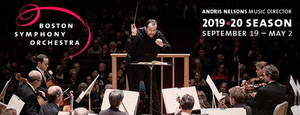
On Sunday, April 26, at 3 p.m., the Boston Symphony Orchestra will launch Heroic Performances, a new 8-week video series of inspiring BSO and Boston Pops concerts for complimentary on-demand viewing at bso.org/athome. The first Heroic Performances video stream will feature BSO Music Director Andris Nelsons leading the BSO and pianist Yefim Bronfman in Mozart's Piano Concerto No. 24 in C minor on a program with Ravel's Daphnis and Chloé, Suite No. 2, a BSO signature work for more than a century.
Also scheduled for the first month of Heroic Performances: May 3: Seiji Ozawa, in his final Symphony Hall concert as BSO Music Director (April 20, 2002), leading Mahler's Symphony No. 9; May 10: Erich Leinsdorf (BSO Music Director, 1962-69) conducting Tchaikovsky's Symphony No. 5 (recorded in Symphony Hall, April 15, 1969); and May 17: Andris Nelsons, in his inaugural concert as BSO Music Director, leading operatic excerpts by Wagner, Puccini, Mascagni, with guest vocalists Kristine Opolais and
Jonas Kaufmann (recorded in Symphony Hall, September 27, 2014).
Since its launch on Monday, March 23, BSO at Home has entertained, enlightened, and engaged audiences around the world with special online content. Although nothing can take the place of a live performance, the audio and video presentations have been helping to lift spirits in these trying times.
"The music was therapeutic: beautiful, strengthening, spirit-raising. Thank you for working so hard to help us heal!" Nancy Keebler, "BSO at Home" listener.
Visits to the Boston Symphony Orchestra's website,
bso.org, are up nearly 90% since the program launched; the audio content has 134,000 listens and video views are at 112,000 and climbing. Social media impressions have surpassed 2.6 million and engagement has more than doubled since the launch of BSO at Home.
On-demand streaming of the BSO's Concert For Our City is at more than 16,000. The free concert was performed at Symphony Hall on February 16, after the BSO's East Asia tour, was canceled because of the coronavirus outbreak.
"Thanks to the BSO for providing "Concert For Our City" & other nightly concerts online for me to enjoy. I listen before bedtime and it relaxes me. Classical music soothes the soul." Sue Hahm, "BSO at Home" listener.
Building on the success of BSO at Home, the BSO is working to create content to fill the void left by the cancellation of the Boston Pops spring season. A new series of Pops-oriented content, "Boston Pops at Home," is expected to debut the beginning of May.
Program Details for First Heroic Performance on Sunday, April 26, at 3 p.m.
The first video stream concert on April 26 opens with a tour-de-force of orchestral virtuosity, Bartók's Concerto for Orchestra, commissioned by BSO conductor Serge Koussevitzky in 1943. Bartók had left Hungary for the United States at the end of 1940, but was suffering from leukemia and had found only a tepid reception as a performer; he later wrote that the new commission effectively offered him a new lease on life. Premiered by Koussevitzky and the BSO in December 1944, the work marked Bartók's first real success with a broad audience and has since become a staple of the repertoire.
Next is Mozart's Piano Concerto No. 24 in C minor. At the height of his popularity in Vienna, Mozart wrote a stunning series of piano concertos for himself to play, of which the darkly dramatic C minor, from March 1786, is arguably the most innovative. His only other minor-mode concerto, the D minor, from a year earlier, ends in a bright D major, in keeping with the expectations of Mozart's audience. The C minor, on the other hand, finishes in the somber minor mode-which would surely have caught contemporary listeners by surprise. Also unusual is that the last movement is a theme-and-variations, a form not typically associated with the concerto genre; it is also his only concerto to include both clarinets and oboes.
Concluding the program is Ravel's Daphnis et Chloé, Suite No. 2 -long a BSO specialty, and most familiar in the concert hall from its final tableau, which Ravel excerpted as the Suite No. 2, and which begins with a musical evocation of daybreak that immediately underscores his stature as one of the great orchestral colorists.
Comments
To post a comment, you must
register and
login.





